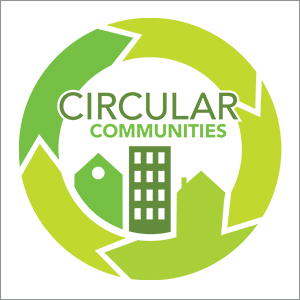
“The way it’s always been done is a barrier to innovation.”
Professional engineer Lindsay Seidel-Wassenaar, project leader and environmental consultant at Sonnevera International is passionate about making changes on the municipal level to help communities become more sustainable.
She is working as a consultant with the Recycling Council of Alberta, leading a team in making big changes for the environment in Banff, Strathcona County, and Lethbridge.
As part of the circular economies initiative, those three communities are spending the next year and a half implementing economic models focused on reusing, sharing, recycling, upcycling, and other environmentally sustainable practices to decrease waste, pollution, and negative effects on the ecosystem.
Seidel-Wassenaar’s team is focusing on creating circular economies at the municipal level because the denser population and easy access to shared materials—alongside the ability to nimbly implement policy changes—enables timely shifts.
Teaming up for the environment
Her team held workshops in each municipality with representatives from different departments, including transportation, sustainability, waste and recycling services, community services, and energy services. In the workshops, representatives in working groups learned about circular economies and reviewed existing systems in their own communities. They brainstormed unique opportunities to transition to a circular economy, determined which initiatives they would tackle first, and set goals for the next five to 10 years.
Seidel-Wassenaar says deprogramming typical consumerism out of our lifestyle—as individuals and as community members—is an important part of the process. “It’s a paradigm shift that has to happen. To allow people to be creative and feel there’s a safe space to think and talk about a circular economy and to start to design it is the first step. If a system is broken, we need to feel safe talking about fixing that system or redesigning that system.” She says even if the ideas don’t pan out immediately, coming up with alternative and environmentally friendly options is how we start making a difference.
Share the goods, save the ecosystem
According to Seidel-Wassenaar, each of the communities is focusing on encouraging and creating a sharing economy. Examples include ride- or vehicle-sharing programs and lending libraries, such as the HodgePodge Lodge in Strathcona County, and the Re-Use It Centre in Banff, where residents can drop off items for those in need. Banff is also opening a tool-lending library to expand its sharing economy, inviting people to rent things like lawnmowers instead of purchase them for individual use.
Encouraging residents to rent or borrow is made more convenient by introducing the idea of mobile libraries—although instead of books, they’re filled with items like bikes, roller skates, and tennis rackets. Imagine a neighbourhood outdoor-equipment van pulling up outside your house with free or low-cost activities galore.
The communities are also focusing on supporting the repair economy. This model promotes individuals and businesses that repair items and awards honourariums to local community members who teach fellow residents to perform repair services. Planning groups also brainstormed ways to educate and empower residents to increase the longevity of their items, and the Recycling Council of Alberta is now aiming to facilitate sewing, repair, and gardening workshops in partnership with the communities.
The success of the circular economy initiative depends heavily on community awareness, so the working groups found a way to make the participating businesses and services easy for residents to find—they created online maps highlighting places that contribute to the project.
“In a lot of municipalities, the systems currently in place for procurement often inhibit innovation,” explains Seidel-Wassenaar. She furthers these systems can prevent staff from purchasing used or more sustainable materials for projects or repairs. In the expansion of its HodgePodge Lodge, Strathcona County found its procurement process prohibited it from sourcing used materials like windows and doors. The county usually has to put a job out to bid, chose the vendor with the lowest price, and follow a strict evaluation process, or it is confined to using certain and often new materials.
“We have to modify these policies to allow us to be more innovative and circular-economy focused,” says Seidel-Wassenaar. “It’s interesting because you think it just makes sense—to purchase a lower-priced, used window rather than buy a new one. But there’s procurement policies and systems in place, and municipalities don’t often allow that.”
A sustainable example for the future
She highlights other issues the working groups aimed to solve, such as decreasing individual travel between Banff and Calgary. The group brainstormed a transportation corridor system—like a bus or train—to take hikers and outdoor enthusiasts to trail heads, making the park system more accessible while decreasing the number of individual cars on the park roads.
Lethbridge is making unique changes to fit their population—with a robust farming community, the municipality is exploring working towards regional sharing of farm and construction equipment. “Instead of counties buying their individual machinery, they are going to try to incorporate a sharing system, where one county has it for a certain number of weeks and then another after.”
Playing its part, Strathcona County will focus on increasing circular economy literacy within its industrial community by providing educational opportunities like workshops. It also wants to find opportunities to use waste products from one business as feedstock for another in what Seidel-Wassenaar describes as a kind of industrial symbiosis. Another avenue for opportunity is decreasing the amount of textiles—clothing and fabrics—going to landfills, something the county has pinpointed as a significant portion of its waste stream.
By the end of 2022, all three communities will have a more circular economy, proving achievable changes can lead the way to a sustainable tomorrow.

